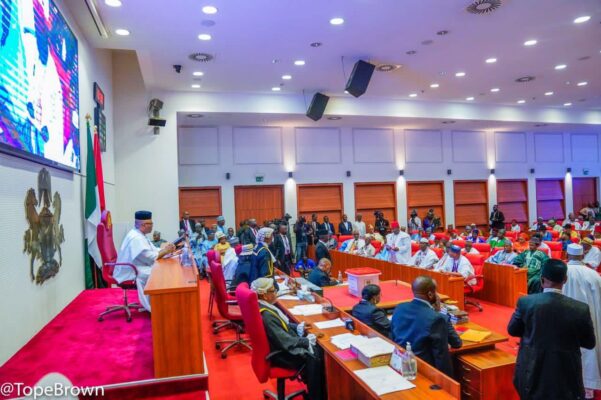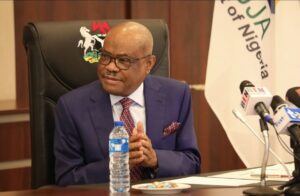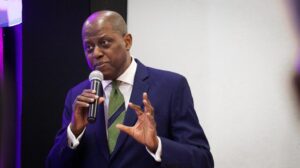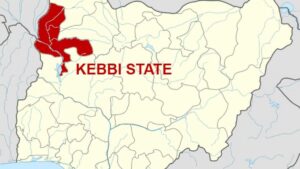The Senate on Wednesday adopted sweeping resolutions aimed at confronting Nigeria’s worsening security crisis, formally classifying kidnapping as an act of terrorism and endorsing the death penalty for convicted offenders, with “no option of fines” and no room for judicial leniency.
The fiery session was triggered by the November 18 attack on Christ Apostolic Church, Eruku, in Kwara State’s Ekiti Local Government Area, where armed men killed two worshippers and abducted 38 others.
Although all hostages were eventually freed through a coordinated operation involving the military, police, DSS, and local vigilantes, senators said the incident exposed a dangerous expansion of insurgent networks and the collapse of security in rural communities.
The debate stemmed from a motion by Senator Yisa Ashiru (Kwara South) titled “Urgent Need to Address Escalating Insecurity in Kwara, Kebbi, and Niger States and Strengthen National Security Frameworks.” The motion opened a tense discussion on attacks sweeping through schools, churches, highways, and entire settlements.
READ ALSO: Alleged Kidnapping At Kiri High School False- Kogi State Govt.
Lawmakers warned that repeated school abductions had forced widespread shutdowns, affecting all schools in several LGAs in Kebbi and Niger, five LGAs in Kwara, and all 47 Federal Unity Colleges. Senator Issa Jibrin (Kogi East) lamented severe manpower shortages, noting that Nigeria’s entire security workforce “do not total one million,” far below Egypt’s 1.5 million.
He called for urgent upgrades in military equipment, stronger intelligence-sharing systems, and the creation of a national reserve force.
Other senators raised concerns that banditry was creeping closer to Osun State through the Eruku–Isapa–Koro axis, where both a retired Army General and a traditional ruler were recently murdered. They also linked rising attacks to dilapidated highways, pushing the Ministry of Works to begin immediate repairs on the Idofian–Omu-Aran–Eruku–Egbe–Kabba road corridor.
Amid rising violence, the Senate ruled that kidnapping has evolved into full-scale terrorism and must attract the harshest possible sanction. “Capital punishment must apply,” lawmakers insisted, arguing that judges should have no discretion to reduce sentences for convicted kidnappers.
The chamber also urged President Bola Tinubu to “further rejig the nation’s security architecture,” though Senator Ali Ndume cautioned that the wording could be misinterpreted, given the recent confirmation of service chiefs. The Senate later clarified that it was calling for stronger coordination, intelligence, and rapid-response capabilities.
In an unprecedented self-assessment move, senators dissolved the Committee on National Security and Intelligence as well as the Committee on Air Force, directing all other security-related committees to submit written oversight reports and brief the chamber behind closed doors within a week.
Read Also
Lawmakers further called for stronger support to registered vigilante groups and ordered a review of the firearms law to allow controlled arming of responsible citizens.
Earlier, the Senate had approved a related motion commending President Tinubu and security agencies for rescuing dozens of abducted victims in Kwara and Niger, while urging the establishment of a Joint Task Force along the Kwara–Kogi axis — a known bandit escape route.
Debate intensified as senators revisited the Eruku church attack, the mass abductions in Kebbi, and the steady rise in kidnappings across Niger State. Senator Ashiru said the Senate was “deeply disturbed” by the Eruku incident and referenced credible reports alleging that soldiers withdrew from a Kebbi school hours before bandits attacked.
Deputy Senate President Barau Jibrin argued that Nigeria must expand its global partnerships, stating, “We should seek assistance from overseas.”
Senate Leader Opeyemi Bamidele called the moment defining, questioning why security agencies had not provided details of terrorists neutralised during the rescue operations. He urged internal reforms within the legislature itself: “If we are calling on the President to rejig the security architecture, we must also look into our own arrangement.”
Senator Enyinnaya Abaribe rejected attempts to blame past administrations, insisting the current government must take responsibility for operational lapses. He cited the alleged troop withdrawal in Kebbi, adding, “If I were the Commander-in-Chief, I would demand answers.”
Senate President Godswill Akpabio raised alarms about intelligence leaks, recalling previous cases where sensitive troop information was compromised. His remarks came as senators decried the failure to prevent attacks despite prior warnings to schools.
Tensions peaked when Senator Seriake Dickson accused the majority caucus of downplaying the gravity of the situation, saying Nigeria was “losing prestige and integrity.” Senators from the APC protested, prompting Akpabio to mute his microphone.
Senator Adams Oshiomhole later defended President Tinubu and demanded a full investigation into the reported troop withdrawal. “Who ordered the military to withdraw? That person should be tried for terrorism,” he argued, a position the Senate adopted.
He also pushed for consistent sentencing in terrorism cases while reinforcing the call for the death penalty for kidnappers.





